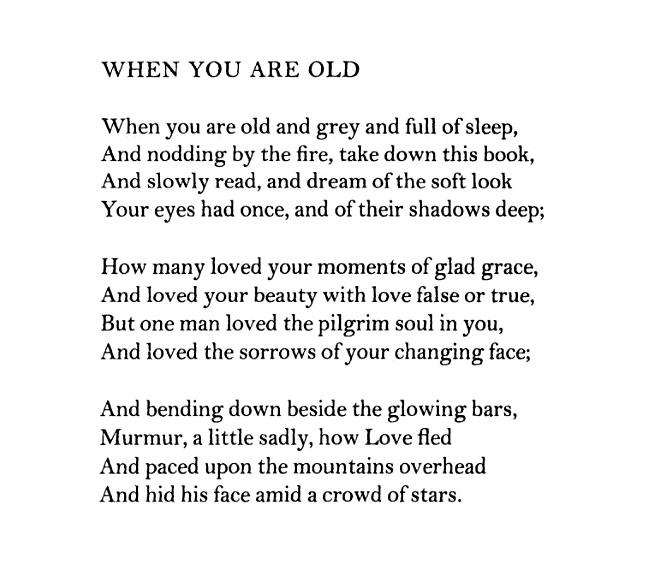Poem Analysis: “When You Are Old” by W.B. Yeats
Biblioklept, 2014.
Written by W.B. Yeats, When You Are Old is an evocative poem that expresses the unrequited love between the speaker, presumably Yeats, and his former lover. Looking fondly upon his lover in her old age, the poem is heavy with longing and sorrow. Reading through Yeats’ amazingly evocative collection of his early poems, plays and fairy tales, I was especially struck by this eponymous poem.
I bought this book on a family vacation to Shanghai at a second-hand bookstore for $5!
The poem consists of three stanzas of 4 lines each; the rhyme scheme is steady – the first stanza is abba, the second is cddc, and the third is effe. Interestingly, each line contains 10 syllables. Furthermore, the stress falls on the second syllable of each foot, lending a further consistency of pulse to the poem. It can be seen from this that the poem is in iambic pentameter, resulting in a lyrical, lulling quality.
Firstly, the title of the poem, When You Are Old, reveals a core theme of the poem: the reality of the continuous passage of time. This can be seen in the first line of the poem, where Yeats uses the conjunction “when” to indicate the movement of time. The quick lexical shift of the word (“When you are old and gray and full of sleep”) shows the rapid flow of time , alluding to the brevity of one’s youth. The diction of his lover “nodding by the fire” further contributes to the imagery of an elderly person who is too weak to stay awake. Instructing his lover to “dream of the soft look / Your eyes had once”, he juxtaposes her current old age to the “soft”, beautiful youth she once possessed – the use of the adverb “once” suggests that this beauty has eroded.
Secondly, the speaker reminisces about the love various people had for his lover. Yeats utilizes alliteration with “glad grace” to create a lyrical and musical effect, while highlighting the sophistication of the young lover. He again alludes to the great beauty of the woman such that “many… loved your beauty with love false or true”, suggesting that she received both vapid admiration for her physical beauty, but was also loved for her inherent qualities. This raises the question: Which category does the speaker fall into – did he truly love her for who she was? Signs point to the latter – he states that he “loved the pilgrim soul in (her)”. A pilgrim comes with connotations of constant movement, but also of steadfastness, virtue, and faith. To love such qualities points to the speaker loving her for her innermost self, an idea reinforced by him loving, too, the “sorrows of (her) changing fate”; he loved her even when she aged and her beauty faded.
Lastly, the speaker pictures his lower “bending down”, ever closer to the “glowing bars”, or the hearth. Imagining her as “a little sad / From us fled Love”, Yeats suggests that this unrequited love might not be as one-sided as readers might originally think, as evidence points to the lover feeling at least some measure of regret over falling out of love with the speaker. Furthermore, the personification of “from us fled Love” carries connotations of “love” as a being that escaped; perhaps, their fallout was caused by something out of their control. In the last two lines, Yeats utilizes achingly beautiful imagery in which love is personified still: “He paced upon the mountains far above, / and hid his face amid a crowd of stars”. Here, the tone is wistful. “Love” is separated from the speaker’s lover both metaphorically and physically (“far above”), and “(hides)” his face.
When You Are Old is a poem marked by more than rhyme; personally, it reads to me as a quiet elegy to an old flame, one that Yeats carries like an ache in his heart.

